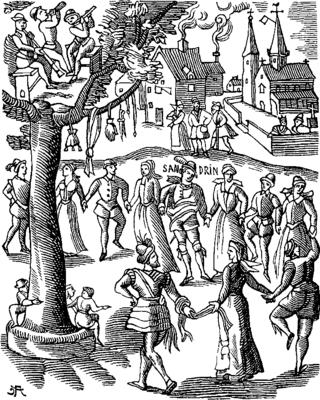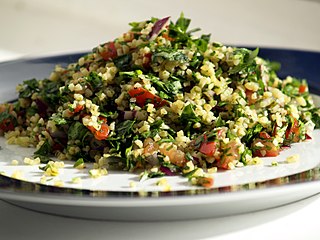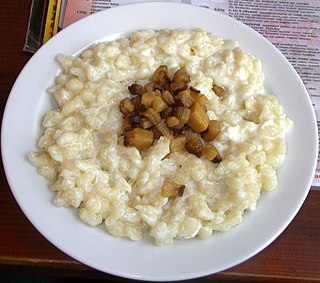Related Research Articles

A festival is an extraordinary event celebrated by a community and centering on some characteristic aspect or aspects of that community and its religion or cultures. It is often marked as a local or national holiday, mela, or eid. A festival constitutes typical cases of glocalization, as well as the high culture-low culture interrelationship. Next to religion and folklore, a significant origin is agricultural. Food is such a vital resource that many festivals are associated with harvest time. Religious commemoration and thanksgiving for good harvests are blended in events that take place in autumn, such as Halloween in the northern hemisphere and Easter in the southern.

Halloumi or haloumi is a cheese made from a mixture of goat's and sheep's milk, and sometimes also cow's milk. Its texture is described as squeaky. It has a high melting point and so can easily be fried or grilled, a property that makes it a popular meat substitute. Rennet is used to curdle the milk in halloumi production, although no acid-producing bacteria are used in its preparation.

Tabbouleh, also transcribed tabouleh, tabbouli, tabouli, or taboulah, is a Levantine salad made mostly of finely chopped parsley, with tomatoes, mint, onion, soaked uncooked bulgur, and seasoned with olive oil, lemon juice, salt and sweet pepper. Some variations add lettuce, or use semolina instead of bulgur.

Mansaf is a traditional Levantine dish made of lamb cooked in a sauce of fermented dried yogurt and served with rice or bulgur.
The New York University Steinhardt School of Culture, Education, and Human Development is the secondary liberal arts and education school of New York University. It is one of the only schools in the world of its type.

Marion Nestle is an American molecular biologist, nutritionist, and public health advocate. She is the Paulette Goddard Professor of Nutrition, Food Studies, and Public Health Emerita at New York University. Her research examines scientific and socioeconomic influences on food choice, obesity, and food safety, emphasizing the role of food marketing.

Pizza al taglio or pizza al trancio is a variety of pizza baked in large rectangular trays, and generally sold in rectangular or square slices by weight, with prices marked per kilogram or per 100 grams. This type of pizza was invented in Rome, Italy, and is common throughout Italy. Many variations and styles of pizza al taglio exist, and the dish is available in other areas of the world in addition to Italy.

Perry N. Halkitis is an American of Greek ancestry public health psychologist and applied statistician known for his research on the health of LGBT populations with an emphasis on HIV/AIDS, substance use, and mental health. Perry is Dean and Professor of Biostatistics, Health Education, and Behavioral Science at the Rutgers School of Public Health.

Helga Tawil-Souri is a Palestinian-American Associate Professor of Media, Culture, and Communication, an Associate Professor of Middle East and Islamic Studies and a Director of Graduate Studies New York University Steinhardt. Her work focuses on technology, media, culture, territory and politics, with a focus on Palestine and Israel.

Massimo Montanari, currently Professor of Medieval History at Bologna University, is a scholar in Food studies. His interest in the subject stems from his researches and studies in Medieval Agrarian History. He has been invited as visiting professor to a number of leading universities in Europe, Japan, the United States, Mexico and Canada.

Ken Albala is Tully Knoles Endowed Professor of History at the University of the Pacific. He has authored or edited 27 books on food and co-authored "The Lost Art of Real Cooking" and "The Lost Arts of Hearth and Home." Albala co-edited the journal "Food, Culture and Society" and has made numerous appearances in media and at conferences discussing food issues He is featured on the DVD: "Food: A Cultural Culinary History." and "Cooking Across the Ages." Albala is also known for his "Food Cultures Around the World" series for Greenwood Press and Rowman and Littlefield Studies in Food and Gastronomy.
James L. Watson is Fairbank Professor of Chinese Society and Professor of Anthropology, Emeritus, Harvard University. He taught at the University of London School of Oriental and African Studies, University of Pittsburgh, University of Hawaii, and University of Houston, and, since his retirement, at Knox College. Among his interests are Chinese emigrants to London, the subject of his doctoral work and first book; ancestor worship and Chinese popular religion in present-day and in history; family life and village organization; food and food systems in East Asia. He is best known outside academia for his edited book, Golden Arches East: McDonald's in East Asia.

Traditional foods are foods and dishes that are passed on through generations or which have been consumed for many generations. Traditional foods and dishes are traditional in nature, and may have a historic precedent in a national dish, regional cuisine or local cuisine. Traditional foods and beverages may be produced as homemade, by restaurants and small manufacturers, and by large food processing plant facilities.
Migrants’ food consumption is the intake of food on a physical and symbolic level from a person or a group of people that moved from one place to another with the intention of settling, permanently in the new location. Food Consumption can provide insights into the complex experience of migration, because it plays a central role to the memory, comfort and all processes needed to adapt to a new country and environment and even to social relations within and beyond the family.
Amy Bentley is Professor of Food Studies in the Department of Nutrition and Food Studies at New York University's Steinhardt School of Culture, Education, and Human Development, and is co-founder of the NYU Urban Farm Lab and the Experimental Cuisine Collective.
Panikos Panayi is a cultural historian known for his books on the social history of food, immigration, and inter-ethnic relations.

The Vegan Studies Project: Food, Animals, and Gender in the Age of Terror (2015) by Laura Wright coined the term and proposed the academic field of vegan studies and serves as the field's foundational text.
Jonathan Zimmerman is a historian of education who is a Professor of History of Education at the University of Pennsylvania Graduate School of Education.
Gastronationalism or culinary nationalism is the use of food and its history, production, control, preparation and consumption as a way of promoting nationalism and national identity. It may involve arguments between two or more regions or countries about whether a particular dish or preparation is claimed by one of those regions or countries and has been appropriated or co-opted by the others.
References
- 1 2 "Fabio Parasecoli". NYU Steinhardt. Retrieved February 22, 2022.
- 1 2 "Talking Cuisines and Cultures with Fabio Parasecoli". New Jersey Monthly . March 2, 2017. Retrieved February 22, 2022.
- ↑ Julier, Alice P. (June 2010). "Review: Bite Me! Food in Popular Culture by Fabio Parasecoli". Food, Culture & Society. 13 (2). doi: 10.2752/175174410X12633934463439 .
- ↑ Carrie, A. Scrufari (November 2018). "Following Food to its Source". Journal of Agriculture, Food Systems, and Community Development. 8 (3): 231–232. ISSN 2152-0801 . Retrieved February 22, 2022.
- ↑ Kasprzyk-Chevriaux, Magdalena (November 23, 2018). "Eating Is Culture: An Interview with Fabio Parasecoli". Culture.pl . Retrieved February 22, 2022.
- ↑ https://www.culturaydeporte.gob.es/dam/jcr:a34d4d52-fb06-472e-b6c3-9fdbd88226e6/04-orden-de-concesi-n-ayudas-hispanex-2022.pdf